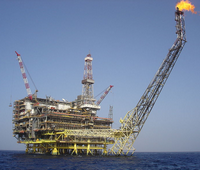The Libyan debacle has been a major wakeup call for those thinking that Europe has a grip on its neighborhood or that the European Union might one day become a serious geopolitical actor. The point is now so moot, it's barely worth making. What's less obvious is that the fallout from the Libyan intervention will have a serious impact on the upstream energy landscape around Europe. That's not just because the EU has lost around 1 million barrels per day of sweet oil production and around 16 percent of its gas supplies for the "EU 15," but also because the West, and more notably NATO, has shown how weak its energy hand really is.
The alliance can't provide the necessary security guarantees to project European influence across adjacent hydrocarbon states. This has always been obvious for Central Asia -- Russia's backyard -- and it now holds for the Middle East-North Africa (MENA) region. That makes two of the four energy corridors Brussels was attempting to open up. The idea was sound enough: diversify supplies in order to reduce structural dependence on Russia. But the execution has been verging on the reckless. Paradoxically, the lack of resolve on Libya has strengthened Moscow's energy hand. So long as upstream producers have no reason to take the EU seriously, Europe will have to go "long," even very long, on Russia to secure vital oil and gas supplies.
The EU's core problem is that the U.S. is increasingly reluctant to play the role of guarantor for European energy interests. As Defense Secretary Robert Gates put it, Libya is not a vital interest to the U.S., and Washington has treated it accordingly. Amid mounting fiscal woes, energy independence looks more tempting than ever in Washington, and with good reason. Domestic shale gas, Canadian tar, Latin American reserves and decent offshore prospects have boosted America's supplies. The furthest Washington is likely to go looking for oil in the future is in West Africa, where there is less need for "geopolitical dredging."

